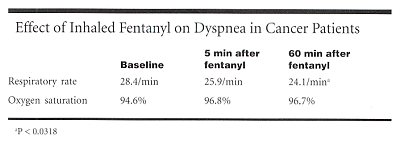Nebulized Fentanyl Relieves Dyspnea in Cancer Patients
SAN FRANCISCO-Inhaled fentanyl can relieve the dyspnea that afflicts 70% of cancer patients and improve oxygen saturation in these patients. Patrick J. Coyne, RN, MSN, reported that fentanyl, currently used for breakthrough cancer pain, can be given through usual home health-care services.
SAN FRANCISCOInhaled fentanyl can relieve the dyspnea that afflicts 70% of cancer patients and improve oxygen saturation in these patients. Patrick J. Coyne, RN, MSN, reported that fentanyl, currently used for breakthrough cancer pain, can be given through usual home health-care services.
"Dyspnea may be the most ignored symptom in cancer patients," Mr. Coyne told Oncology News International. "It occurs in 70% of cancer patients, and there is currently no satisfactory treatment. Previous approaches have included steroids, bronchodilators, and oral morphine. Our data show that nebulized fentanyl works faster and causes fewer side effects. It is also very economical, at $0.13 to $0.55 per dose." Mr. Coyne is clinical nurse specialist in oncology/pain management at Medical College of Virginia Hospitals in Richmond, Virginia.
Patient Perceptions
Mr. Coyne and colleagues tested nebulized inhaled fentanyl citrate (25 mg in 2 mL saline) on patient perceptions of dyspnea, respiratory rate, and oxygen saturation in a convenience sample of 37 cancer patients on a dedicated oncology unit. The investigators assessed patient perception of whether breathing stayed the same, worsened, or improved with treatment. They also measured the effect of inhaled fentanyl on respiratory rate and oxygen saturation by pulse oximetry at baseline, 5, and 60 minutes.
Mr. Coyne said that the trial was not placebo controlled because the institutional review board would not approve a placebo-controlled trial design in this situation.
Twenty-six of 37 (79%) patients in this pilot study reported improvement in breathing; 3 (9%) were unsure; and 4 (12%) reported no improvement. Respiratory rates improved from a baseline of 28.4/min to 25.9/min at 5 minutes and 24.1/min at 60 minutes:

Oxygen saturation improved from 94.6% at baseline to 96.8% at 5 minutes and 96.7% at 60 minutes. No side effects were observed.
"Fentanyl citrate nebulizers appear to be safe and effective in the treatment of dyspnea in individuals with a life-limiting disease process," Mr. Coyne concluded. "Inhaled nebulized fentanyl citrate significantly improved patient perception of breathing, respiratory rate, and oxygen saturation. This inexpensive and readily available treatment may offer substantial relief of dyspnea. Randomized clinical trials to determine size and length of effect are ongoing."